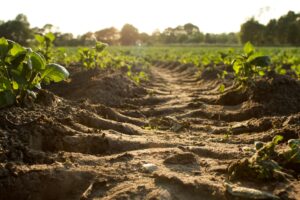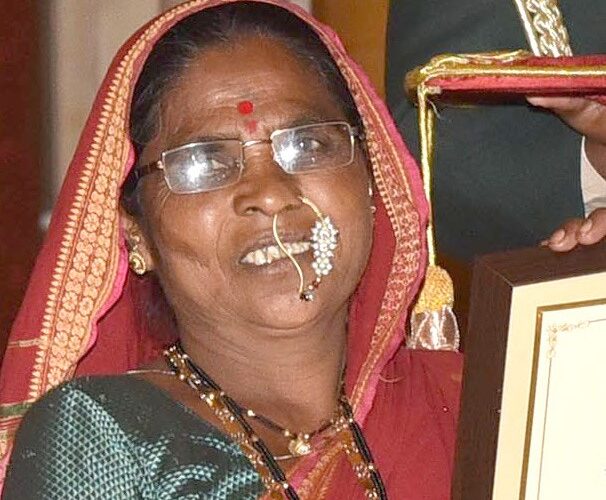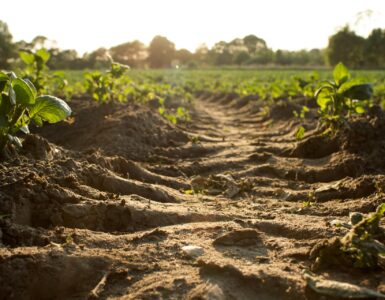“The journey of a thousand miles begins with a single step.”– Lao Tzu
Rahibai Soma Popere’s remarkable journey, a testament to ancient wisdom, began when she and her seven-member family migrated to Akole Taluka in Maharashtra.
Despite her humble background, this woman in her fifties has accomplished more than many with far greater privileges could ever hope to achieve in a lifetime. Her quiet dedication and significant contributions have earned her the moniker “Beej Maata” or Seed Mother.
Her journey unveils the story of resilience, determination, and unwavering passion.
Read below how an individual’s commitment can spark profound change within a community and beyond.
Sowing the Seeds of Change

Rahibai comes from a tribal family in Komblne village of the Akole tribal block in Ahmednagar district of Maharashtra. The family farmed during the monsoon season, however, they worked as labourers in a sugar factory during the remaining months.
Rahibai did not attend school due to poverty and started supporting her family in agricultural work at the age of 10 years. A few years later, she got married to Soma Popere also from the farming community.
Over the years she learned indigenous ways of farming, agrobiodiversity, and traditional culture through practice and experience.
Drawing on her experiences and a keen understanding of the land, she implemented traditional water conservation methods, like creating a farm pond. These efforts transformed previously unproductive acres into fertile ground, yielding vegetables that provided a much-needed income.
Her enthusiasm and resourcefulness led to support from different NGOs, enabling her to raise funds for poultry and establish a nursery. Over time, she incorporated paddy cultivation, achieving yields higher than those obtained through conventional practices.
Preserving the Seeds of Traditions
Rahibai’s vast experience has instilled in her a deep appreciation for the value of indigenous crop varieties, leading her to dedicate herself to their conservation.
She understood the benefits of native seeds, asserting that they are not only drought and disease-resistant but also more nutritious and contribute to soil fertility, requiring neither chemical fertilizers nor excessive watering. Furthermore, the conservation of native seeds played a vital role in protecting vulnerable farmers from exploitation.
The promotion and patenting of hybrid seeds by large corporations threaten the extinction of native crops, creating dependence among farmers who cannot save these hybrid seeds for subsequent planting.
She started with a nursery of Blackberry and then proceeded to establish a nursery of hyacinth beans, rice, vegetables, and beans landraces. Over time, Rahibai Popere collected and preserved an impressive array of native crops, vegetables, and numerous oilseeds.
With the establishment of a seed bank, where farmers borrow seeds and return double the quantity, she has fostered self-sufficiency within the community. This seed bank distributes more than a hundred varieties of almost three dozen food crops, providing financial benefits to farmers.
Her ambitious goal is to conserve and promote the sustainable use of crop varieties and to help tribal households establish kitchen gardens, ensuring their nutritional security.
In this context, Rahibai Popere’s journey in preserving native seed varieties is instrumental in safeguarding genetic diversity and ensuring the well-being of both farmers and consumers.
Beyond Seeds
Beyond seed conservation, Rahibai Popere also champions the importance of natural farming, agro-biodiversity, and other social initiatives like health and sanitation.
She regularly conducts training sessions for farmers and students on topics ranging from seed selection and soil fertility improvement to pest management and control.
She has collaborated with other women farmers in Akole Taluka to collect local seeds. This collaborative effort led to the formation of a self-help group (SHG) called the Kalsubai Parisar Biyanee Samvardhan Samiti, dedicated to the conservation of native seeds.
Rahibai also leads another SHG, the Chemdeobaba Mahila Bachat Gat in Kombhalne, which undertakes various social initiatives, including health camps and the provision of solar lamps, in addition to its agricultural work.
She also inspires her community to avoid farm chemicals, observing that villagers frequently fell ill after consuming food grown from hybrid crops.
Additionally, Rahibai Popere actively participates in programs with other countries in the seed sector and local agricultural fairs to further the cause of land conservation.
Celebrating the force of change
Rahibai’s quiet and selfless dedication to sharing her knowledge and benefiting her community has been richly rewarded. Her remarkable journey has garnered significant recognition and acclaim.
Her wall of honour includes the Best Seed Saver award from Krishi Vigyan Kendra, Bhableshwar, BAIF’s Best Farmer Award in 2014-15 from BAIF and Nari Shakti Puraskar 2018, a national honour bestowed by India’s Ministry of Women and Child Development.
In 2018 her contributions earned her a place among three Indians on the BBC’s “100 Women 2018” list.
Raghunath Mashelkar, former Director General of the Council of Scientific and Industrial Research, bestowed upon her the fitting title of “Seed Mother.”
In 2020, Rahibai Soma Popere was conferred India’s fourth highest civilian national award Padma Shree by Indian President Ram Nath Kovind for her contribution to seed conservation and agriculture.
Paying due respect
Seeds are the building blocks of plants, which are essential for maintaining biodiversity. By conserving seeds, we ensure the survival of different plant species, safeguard against the loss of valuable genetic material, and preserve natural heritage.
Rahibai Popere’s tireless work preserving indigenous seeds, promoting sustainable agriculture, and empowering women has profoundly impacted countless farmers and significantly contributed to safeguarding India’s rich agricultural heritage.
As the “Beej Maata” or “Seed Mother of India,” Rahibai’s legacy will continue to inspire future generations, reminding us of the critical importance of preserving our natural resources and fostering sustainable livelihoods for all.






Add comment